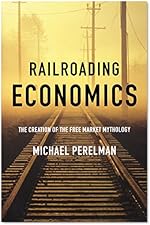Archive for January, 2010|Monthly archive page
Banning Foreign Companies’ Campaign Contributions
Many companies have tried to reduce taxes by incorporating abroad — the so-called Bermuda Inversion. Wouldn’t the banning of foreign campaign contributions apply to them.
Finance vs. Independence at the Fed
Richard Smith is a historian who is doing a biography about my mother’s cousin.
Here is his timely piece about the corrupting influence of finance on the Fed — in particular about A. P. Giannini got Truman to remove Marriner Eccles from his position as chairman of the Fed. So much for independence.
Smith, Richard H. 2010. “Breaking News (From 1948): Banking Mogul Ousts Fed Chairman.” Huffington Post (28 January).
http://www.huffingtonpost.com/richard-h-smith/breaking-news-from-1948-b_b_439398.html
The Ideological Use of Cost-Benefit Analysis
This short section from my forthcoming Invisible Handcuffs discusses the ideological use of cost-benefit analysis.
Obama is not a Wimp
Barack Obama gave the appearance of meekly appealing for bipartisanship, only to get kicked in his private parts. Yet, look how courageously he is willing to take on the liberals and his party. Along with Larry Summers and Rahm Emanuel, he can really kick butt. Locale he has taken on the teachers union by ramping up Bush’s No Child Left Behind. Watch him cut back entitlements for those people without enough initiative to run their own hedge funds.
He may down to the Israelis, but look how decisive he is in Afghanistan, willing to fight an unwinnable war. Not even Joe Lieberman can top him.
And what about his decisive actions against the fat cats? He didn’t kick them when they were down. A would not real hero to behave that way. No, he gave them billions of dollars, but now he’s decided to take them on, by creating regulations so tough that the fat cats will have to spend thousands of dollars to figure out how to circumvent them.
Barack Obama, change you can believe in.
Movie Theaters and Guard Labor
In 1963, I was a ticket taker in a small art theater in Ann Arbor, Michigan. I took the tickets and then for the last show, I had to sit by the door and make sure that nobody came in during the middle of the movie. I am also a relative of the Warner Bros., who asked my grandfather, as well is just about everybody in town to become a partner for $50. My grandfather asked why anybody would pay a nickel to watch a shadow on the wall. I’m in my office now looking out the window at Warner Street, so named because the movie, Robin Hood with Errol Flynn, was made here.
I also remember when movies had ushers. Some even had organs to play for the audience. The labor content of movie theaters has fallen precipitously, especially when one projectionist can take care of a multiplex.
Guard Labor
My article on Guard Labor is in the new issue of Dollars and Sense. It is extracted from my forthcoming book, The Invisible Handcuffs.
http://www.dollarsandsense.org/archives/2010/0110toc.html
The article begins:
Guards are everywhere in a capitalist economy. A few are dressed up in uniforms, so they are easy to spot. But most do not look like guards at all. Some sit in comfortable offices; others work on assembly lines in factories. James O’Connor, a prolific sociologist from UC Santa Cruz, describes one familiar set of guards whom we do not usually think of as guards:
Consider the labor of the ticket seller at a movie house. The seller’s task is merely to transfer the right to sit in the theater to the movie-goer in exchange for the price of a ticket. But it may not be immediately obvious that it is not the lack of a ticket that keeps you out of the theater … The ticket is actually torn up and discarded by a husky young man who stands between the box office and the seat that I want.
These guards are a central feature of capitalism. Capitalists depend upon guard labor to protect their commodities, including the goods and premises they own, but especially the labor-power in their employ. Capitalism’s reliance on guard labor deforms the entire productive process, not only wasting labor, but also snuffing out badly needed creativity.
The Hypocrisy of Corporate Personhood
“Corporations have neither bodies to be punished, nor souls to be condemned; they therefore do as they like.” — often misquoted as “Did you ever expect a corporation to have a conscience, when it has no soul to be damned, and no body to be kicked?”
Edward Thurlow, 1st Baron Thurlow. 1731-1806. Lord Chancellor of England, 1778-1783, member of Parliament at end of eighteenth century
In light of the Supreme Court’s outrageous decision about campaign finance, I would suggest a move to treat corporations as persons — making them liable to imprisonment and even the death penalty, when they cause loss of life.
But no, the pro-corporate types invoke a brilliant act of legerdemain, making the death penalty for corporations unthinkable. As I noted in Manufacturing Discontent:
“during the height of the scandal regarding Enron’s multibillion dollar frauds, a “Wall Street Journal opinion piece entitled, “Corporations Aren’t Criminals,” noted: “Under the common law, a corporation could not be guilty of a crime because it could not possess mens rea, a guilty mind” (Baker 2002). Sadly, the author was correct — at least in so far as the current courts are concerned. In the eyes of some judges, the law goes even further than ruling that corporation that violate the law lack a guilty mind. They insist that corporate managers, who should possess a mens rea, have an ethical responsibility to violate the law when doing so will prove profitable for stockholders. For example, Frank H. Easterbrook and Daniel R. Fischel, the former a federal judge as well as a senior lecturer at the University of Chicago School of Law, wrote:
It is not true, however, that there is a legal duty to enforce every legal right …. Managers do not have an ethical duty to obey regulatory laws just because those laws exist. They must determine the importance of these laws. The penalties Congress names for disobedience are a measure of how much it wants firms to sacrifice in order to adhere to the rules: the idea of optimal sanctions is based on the supposition that managers not only may, but also should violate the rules when it is profitable to do so. [Easterbrook and Fischel 1982, pp. 1171 and 1177 n]”
Haiti Everywhere
“Much was said this night against the parliament. I said that, as it seemed to be agreed that all Members of Parliament became corrupted, letter to chuse men already bad, and so save good.”
James Boswell
In my book, The Pathology of the US Economy, I wrote about how I was witnessing the United States following when I called “The Haitian Road to Development.” What I meant was an economic strategy based on pushing wages down to make the economy productive.
Over the last two days, I have been thinking about the Haitian Road to Development more broadly. We lost our power. I don’t mean political power; I mean electricity that powers our house. Without electricity, the computer was dead. Reading was possible only during particular hours. We were dependent upon a corporation that has been attempting to maximize profits by cutting back on maintenance.
Yesterday I had to ride my bike about 12 miles in a heavy rainstorm with winds up to 60 miles an hour. The rains stung my face. At times, I had to dismount and walk the bicycle to avoid getting pushed into oncoming cars.
Finding myself at the mercy of the elements, for brief moments, I would think about my minor difficulties and inconveniences for brief moments, then imagining how conditions in Haiti were infinitely worse. Everybody who knows anything about Haiti realizes the way that outside forces (largely the United States) have crippled the public sphere. Poor people have no choice but to denude hillsides for charcoal and build shanties that are vulnerable to the inevitable mudslides. Continue reading
Off the Table or Under the Table: Economics vs. Health Care
Apparently, the Obama folks are following the Bush precedent, paying Johathan Gruber, a health care economist, under the table — at least he seems to have done nothing to let it be known — to influence the health care debate
.
http://emptywheel.firedoglake.com/2010/01/08/gruber-did-not-disclose-conflict-to-the-wapo/
I posted two brief mentions about Jonathan Gruber and health care, without realizing that he had a $392,600 contract with Health and Human Services that had not yet been made public.
First, last November, I posted the following comment in response to a New York Times article about Health Care, alluding to single payer being “off the table.”:
Jonathan Gruber is a health economist from MIT — an expert, no doubt. David Leonhardt quotes his favorable comment on the Senate health care bill: “I can’t think of a thing to try that they didn’t try.”
Leonhardt, apparently, never bothered to ask him about single payer, which was off the table.
A year before, prior to the contract, I posted:
I’m just looking over the August NBER digest. It covers five NBER articles, of which three may be mildly interesting. The first has the scary title, Public Insurance Expansions Crowd Out Private Health Insurance by Jonathan Gruber and Kosali Simon. We learn that: For every 100 children who are enrolled in public insurance, 60 children lose private insurance.” Thank God that George Bush had the courage to stand up to the radicals and threatened to veto an expansion of child health coverage. Otherwise, they might lose their private insurance.
http://www.nber.org/digest/aug07/w12858.html
Jane Hamsher has a piece showing how effectively the White House and the Democrats use Gruber’s expertise to support their own mangling of health care reform.
http://www.huffingtonpost.com/jane-hamsher/how-the-white-house-used_b_421549.html
Glenn Greenwald has a piece, the second part of which compares this arrangement to what Bush did with Armstrong Williams and Maggie Gallagher and the CNN generals.
http://www.salon.com/news/opinion/glenn_greenwald/2010/01/15/sunstein/index.html
 Comments (1)
Comments (1)
 25 – The Confiscation of American Prosperity: From Right-Wing Extremism and Economic Ideology to the Next Great Depression
25 – The Confiscation of American Prosperity: From Right-Wing Extremism and Economic Ideology to the Next Great Depression 30 – Manufacturing Discontent: The Trap of Individualism in Corporate Society
30 – Manufacturing Discontent: The Trap of Individualism in Corporate Society Class Warfare in the Information Age
Class Warfare in the Information Age Railroading Economics: The Creation of the Free Market Mythology
Railroading Economics: The Creation of the Free Market Mythology Steal This Idea: Intellectual Property Rights and the Corporate Confiscation of Creativity
Steal This Idea: Intellectual Property Rights and the Corporate Confiscation of Creativity The Invention of Capitalism: Classical Political Economy and the Secret History of Primitive Accumulation
The Invention of Capitalism: Classical Political Economy and the Secret History of Primitive Accumulation The Perverse Economy: The Impact of Markets on People and the Environment
The Perverse Economy: The Impact of Markets on People and the Environment